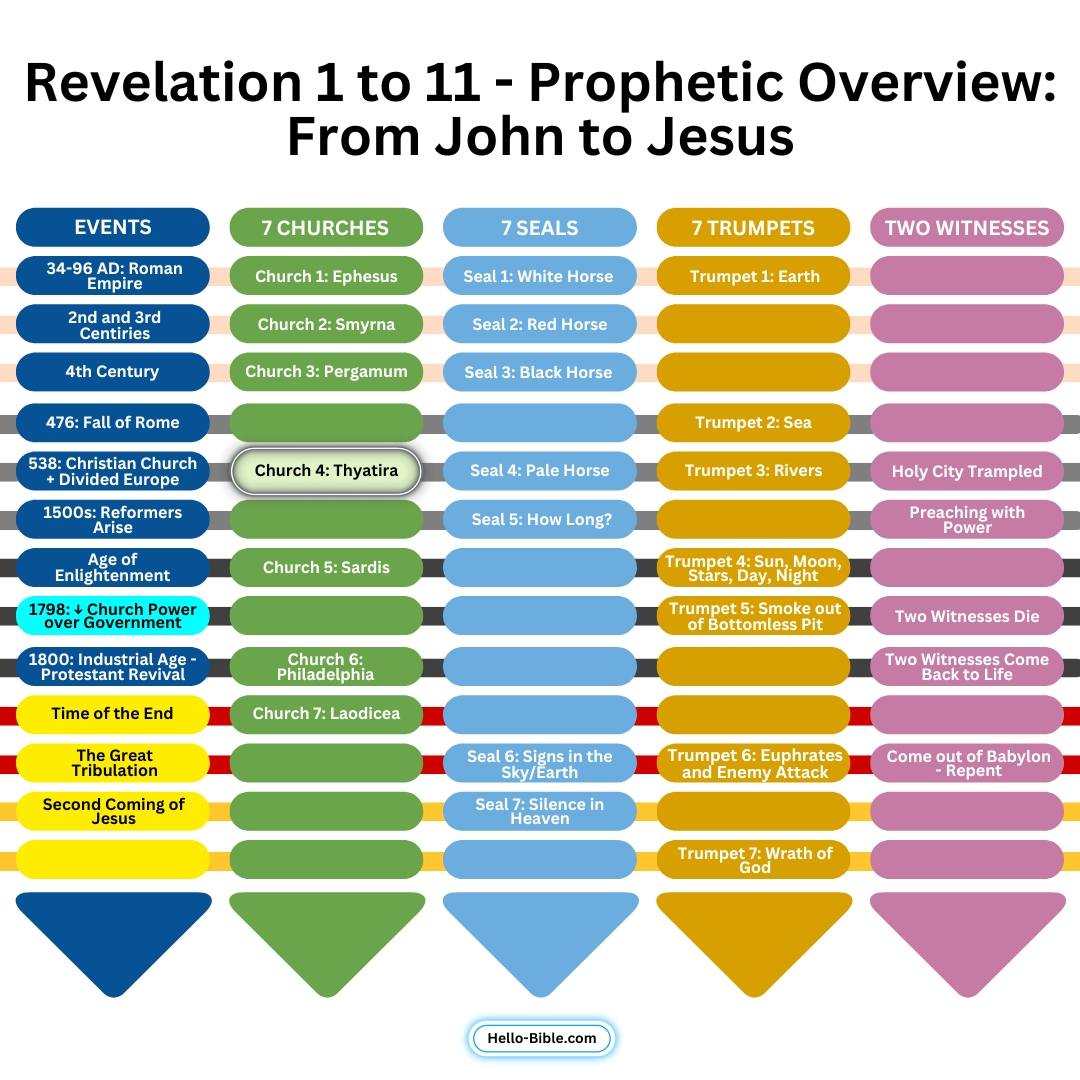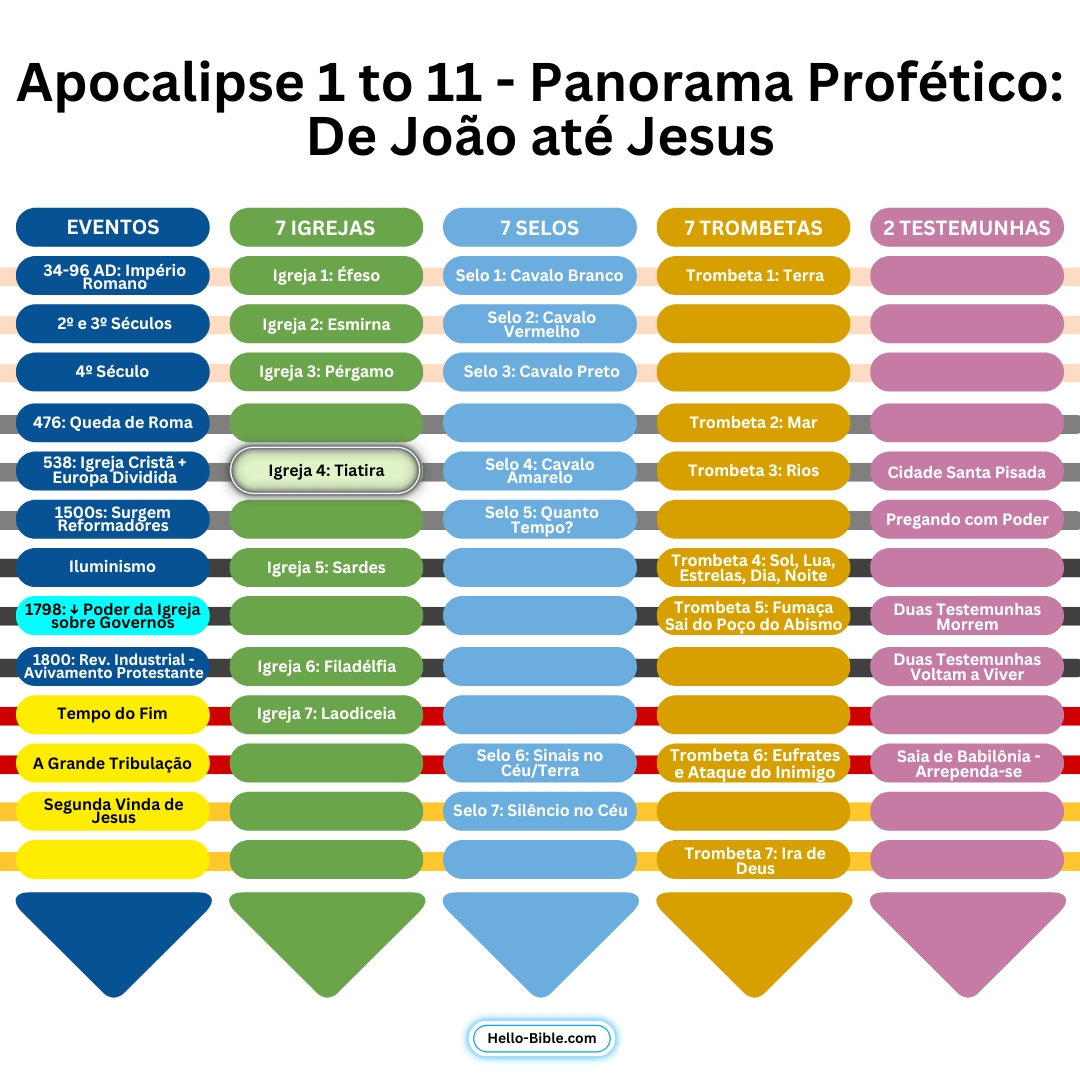18 And unto the angel of the church in Thyatira write; These things says the Son of God, who has his eyes like unto a flame of fire, and his feet are like fine bronze;
19 I know your works, and love, and service, and faith, and your patience, and your works; and the last to be more than the first.
20 Nevertheless I have a few things against you, because you allow that woman Jezebel, who calls herself a prophetess, to teach and to seduce my servants to commit fornication, and to eat things sacrificed unto idols.
21 And I gave her time to repent of her fornication; and she repented not.
22 Behold, I will cast her into a bed, and them that commit adultery with her into great tribulation, except they repent of their deeds.
23 And I will kill her children with death; and all the churches shall know that I am he who searches the minds and hearts: and I will give unto every one of you according to your works.
24 But unto you I say, and unto the rest in Thyatira, as many as have not this doctrine, and who have not known the depths of Satan, as they say; I will put upon you no other burden.
25 But that which you have already hold fast till I come.
26 And he that overcomes, and keeps my works unto the end, to him will I give power over the nations:
27 And he shall rule them with a rod of iron; as the vessels of a potter shall they be broken to pieces: even as I received of my Father.
28 And I will give him the morning star.
29 He that has an ear, let him hear what the Spirit says unto the churches.
Drawing Connections
We have arrived at the 3rd and final part on the study about the church in Thyatira. Part 1 and 2 gave us a good base to understand that there are very deep connections to Old Testament events that we have to take into account when exploring this message. Without those connections, we would run the risk of missing the symbolism around Jezebel and her children, their unfaithfulness, and what God is telling the people then and us today. Let's now go over the details of the formatted letter and see its prophetic application.
PART 3
Closer Look
*** Recipient -> “To the Angel of the Church in Thyatira” ***: Once again, the letter is addressed to the leader of the church, but applicable to all the members. Please see the comments in study #9, #12, and #14.
*** Sender -> “the Son of God, who has eyes like a flame of fire, and whose feet are like burnished bronze” ***: In the vision of the Glorified Christ (lesson #8), Jesus is seen as “someone like a son of man” (Revelation 1:13). But here, for the church in Thyatira, Jesus comes as the Son of God. The Bible tells us that those who believe in the Son of God, also accept His testimony, which is: “God has given us eternal life, and this life is in his Son” (1 John 5:10-11). The one who overcomes the world is the one who believes that Jesus is the Son of God (1 John 5:5). Jesus also presents Himself as having eyes like a flame of fire. As we studied in lesson #9, nothing can hide from His sight (Hebrews 4:13). He sees everything (Job 28:24; Proverbs 15:3). He is the one who searches minds and hearts (Revelation 2:23). Jesus ends His introduction by identifying Himself as the one having feet like burnished bronze. Again, in lesson #9, we saw that Christ was the sacrifice raised on the pole, just as the bronze snake in the desert. He was burned on the bronze altar, so we could be saved from our sins. He stands on strong, stable, and mighty feet, which cannot be moved away from the truth of God. This description is similar to the one found in Daniel 10:6.
*** Assessment -> “I know…” ***: Jesus knows more than anyone else what has been going on in the church. To this divided congregation, the message is given in pairs:
- Works: Love and faith; service and patient endurance; recent works versus first ones. This description gives us the impression that the church in Thyatira has sincere members. Love and faith are a common pair in the New Testament (Galatians 5:6; Ephesians 1:15; Ephesians 6:23; 1 Thessalonians 3:6; 2 Timothy 1:13; Philemon 1:5). It is because of love and faith that people become involved in service, and their hope in Jesus inspires their endurance (1 Thessalonians 1:3; Hebrews 6:10). Faith and endurance (or perseverance) are two of the most important characteristics of God’s people (Revelation 13:10; Revelation 14:12). The works of this church seem to be increasing as time passes.
- Problem: The church in Thyatira had a serious internal problem. It had become tolerant of the so-called prophetess Jezebel, who had been “teaching and seducing” God’s people to do things contrary to His will. In study #20, we saw that, in a prophetic view, Jezebel represents the unfaithful church. To the first century Christians, she was likely the leader of a heretic movement coming from within the church. She was leading people into the wrong type of worship (symbolized by the term sexual immorality). And she was teaching them false doctrines that do not point to Jesus as the central focus (symbolized by the eating of the food offered to the idols). The Christians of that church were being misled both in the spiritual sense of this allegory, as well as in the physical sense. Jesus should be the Bread of Life that the members consume daily. Instead, they were feasting on false teachings that corrupted the fundamental truths of the Gospel. Verse 21 says that Jesus gave Jezebel time to repent, but she refused. And that is why He gave this warning: He will afflict Jezebel and those who follow her teachings (symbolized by the term “commit adultery with her”). They were committing spiritual infidelity against God. The end of verse 22 indicates that this punitive statement of destruction had a redemptive purpose. Jesus made it conditional to her repentance. Just like the children of Ahab were killed because of his sin (2 Kings 10:6-8), and like Jezebel’s daughter, Athaliah, was killed because of her wickedness, the children of Jezebel in Thyatira would also be killed. But before their destruction, Jezebel and her followers would suffer when thrown on a bed of tribulation. In verse 23, Jesus makes 2 promises:
- The destruction of Jezebel and her followers would show all the churches that Jesus is the one with the fiery eyes, who brings on judgment, and who searches minds and hearts;
- Everyone would receive according to their works. The searching of minds and hearts is written in the original in Greek as “searches kidneys and hearts”. In ancient times, kidneys were thought to be the seat of emotions, and the heart was the seat of intelligence and will (Jeremiah 17:10). All the churches, faithful or unfaithful, would know that Jesus can see their motives behind each decision they make. Each person will be judged according to their works. Their works will be presented to God whether or not they reflect the result of a life purposefully committed to Christ and His truth.
Those who believe in the Son of God and obey God’s commands have nothing to worry about, because they are already engaged in doing the work that God requires. According to Jesus, “The work of God is this: to believe in the one he has sent” (John 6:29). But how do we know if we believe in the one God has sent, and not in a counterfeit version of Him? In Revelation 12:17, Christ describes the children of His faithful church: “those who keep God’s commands and hold fast their testimony about Jesus”. And so, we should not follow those people teaching principles that go against or that alter God's commandments and the testimony of Jesus, because they are not pointing to the one whom God has sent.
*** Appeal -> “Hold fast to what you have ” ***: The teachings of Jezebel are so dangerous, that in verse 24 Jesus calls them “the deep things of Satan”. Basically she was telling the people to take the easy way. To make the decision that would make them more comfortable. To compromise on just a few things in order to blend in better with the social demands of life. This seemingly innocent theology of the easy road is clearly not from God. A diluted dose of the Gospel will certainly not be the full strength dose required to keep someone on the narrow road to salvation. Jesus said: “Enter through the narrow gate. For wide is the gate and broad is the road that leads to destruction, and many enter through it. But small is the gate and narrow the road that leads to life, and only a few find it.” (Matthew 7:13-14). The Christian life is not an easy walk, but it is a worthwhile journey through the “small gate and narrow road”. The extra baggage that 'Self' likes to hold on to needs to be left at the gate before going through it. The only thing that fits through the small gate that believers can carry with them is the truth. The truth is the balancing rod that keeps the follower of Christ from falling out of the narrow path. Jesus calls the few remaining in Thyatira, who were still on this narrow path, to keep holding on to the truth until He returns.
*** Call to hear the Spirit -> The Spirit says to the churches ***: The message of “hold on to God’s truth until Jesus’ return” was to be heard by all churches. There are no excuses not to hear this call. Please see the notes on study #14. Christ is saying that it is possible to keep the faith, the works, the love and perseverance even when the majority of the church is following corrupted beliefs.
*** Promise -> To the one who overcomes ***: Continuing on the theme of everything said in pairs, the one who overcomes receives 2 promises: authority over the nations, and the morning star.
- Authority over the nations: this passage reminds us of the promise in Psalm 2:8-9: "Ask me, and I will make the nations your inheritance, the ends of the earth your possession. You will break them with a rod of iron; you will dash them to pieces like pottery.” The one who overcomes will rule over the nations, and break them to pieces like one would break a clay pot. This image of broken pots reminds us of the instructions found in Leviticus 11:29-35, given to the Israelites regarding unclean animals. If one of those animals died and their carcasses touched their clay pots, the pots had to be broken in order not to contaminate their food. In Jeremiah 18:6-10, we read what God had to say regarding the work of a potter and the nations of the Earth: "He said, 'Can I not do with you, Israel, as this potter does?' declares the Lord. 'Like clay in the hand of the potter, so are you in my hand, Israel. If at any time I announce that a nation or kingdom is to be uprooted, torn down and destroyed, and if that nation I warned repents of its evil, then I will relent and not inflict on it the disaster I had planned. And if at another time I announce that a nation or kingdom is to be built up and planted, and if it does evil in my sight and does not obey me, then I will reconsider the good I had intended to do for it'.” Jesus can give His authority to the overcomer because He received it from the Father (Matthew 28:18; Revelation 12:10). Christ also has an iron scepter that He uses to rule the nations (Revelation 12:5; Revelation 19:15). In the chapters of Revelation 20 and Revelation 21, we read about the people of God sitting on the throne, ruling with Jesus.
- Morning Star: When Balaam was hired to curse the Israelites, he was unable to do it, and blessed them instead. God did not allow the cursing of His people. Instead, God used Balaam to prophecy the message we find in Numbers 24:17: “I see him, but not now; I behold him, but not near. A star will come out of Jacob; a scepter will rise out of Israel.” Jesus explains this prophecy in Revelation 22:16: “I, Jesus, have sent my angel to give you this testimony for the churches. I am the Root and the Offspring of David, and the bright Morning Star.” The Bible tells us that we need to pay attention to the prophetic message of God “as to a light shining in a dark place, until the day dawns and the morning star rises in [our] hearts.” (2 Peter 1:19). After a long walk in the darkness of this world, the one who overcomes will receive Jesus Himself, shining in all His glory on the day of Christ’s Second Coming.
*** Church history view and prophetic application ***: The prophetic view of this church fits the time known as The Dark Ages, or The Middle Ages, which spans from the 6th to the16th centuries. Interestingly enough, historians named this period very appropriately. The letter to the middle church represents the history of the church in the Middle Ages. The world went through a period of spiritual darkness. The simple message of the Gospel was replaced by pagan rituals and objects, all disguised as Christian theology. The worship and reverence to the image of Bible characters became accepted, expected, and required. The church leadership discouraged the people from reading the Bible, claiming it was for the well-studied clergy only.
During the Middle Ages, we had the Crusades, and the Inquisitions, when the church led an intense campaign persecuting those who were not following the teachings of the Roman church. Towards the end of the Middle Ages, a new awakening began with the movement of Reformation. In 1517, Martin Luther posted his now famous work The Ninety-Five Theses, where he criticized the selling of indulgences, purgatory, merit of the saints, among other theological points. There had been other people before Luther, such as Jan Hus, Peter Waldo, and John Wycliffe, who criticized the church’s position on indulgences or proposed reform of the church. The church launched a Counter-Reformation movement, which started with the Council of Trent. Most of the battle against the Protestant movement was done by the order of the Jesuits. The Reform led to a revival of the people, and of the original message of the Scriptures.

© Hello-Bible - 2024

© Hello-Bible - 2024
Overview
In the letter to the Church in Thyatira we see the contrast between the few faithful ones and the many committing spiritual adultery; the truth of god and the lies of Satan; the works coming from faith and the works requiring that people repent from. Jezebel may deceive the people for some time, but she cannot deceive the fiery eyes of the Lord. He will bring His judgement on the unfaithful majority posing as Christ’s followers. God’s faithful church is the minority who continues on the narrow path to salvation. Its members are called to keep the one thing that can keep them from believing in the deceptive message of the majority. They are called to keep the truth. God’s truth gives the genuine Christians a type of joy that nobody can take away, not even when going through suffering and persecution. Their joy is the firm belief that the Redeemer has given them a prize far more valuable than temporary material possessions: eternal life with the Creator. He comes after a long period of spiritual darkness, shining bright as the morning star. His chosen people will reign with Him forever.
This text has a corresponding Facebook post. If you enjoyed it, please leave a Like and a comment, and don't forget to share it with your friends.
This Study on Facebook
Our Latest Facebook Posts
Image attribution: The blog image in this page was cropped to fit the design of our website. The original image can be found here.
Ian Scott (Αρχικό) Wolfymoza (Ανέβασμα), CC BY-SA 2.0, via Wikimedia Commons
